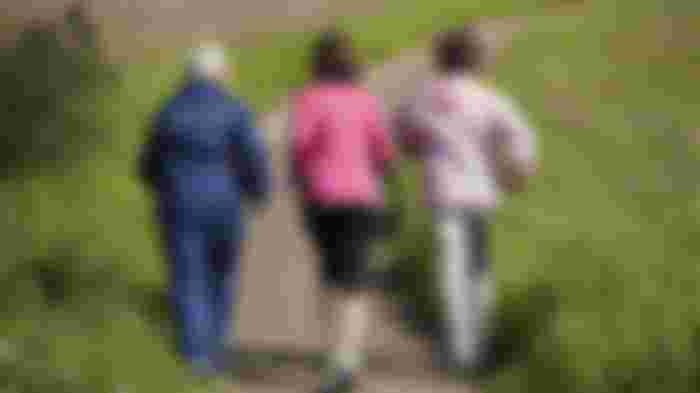Aging is a series of processes that include direct damage, accumulation of cellular waste, errors, and imperfect repairs as well as the responses to them.These processes result in the familiar signs of aging and ultimately to the development of age-related diseases.

These are the changes that happens to our body as we age:
Cardiovascular System. The most common change in the cardiovascular system is stiffening of the blood vessels and arteries, causing your heart to work harder to pump blood through them. The heart muscles change to adjust to the increased workload. Your heart rate at rest will stay about the same, but it won't increase during activities as much as it used to. These changes increase the risk of high blood pressure (hypertension) and other cardiovascular problems.
Bones, Joints and Muscles. With age, bones tend to shrink in size and density, weakening them and making them more susceptible to fracture. You might even become a bit shorter. Muscles generally lose strength, endurance and flexibility, factors that can affect your coordination, stability and balance.
Digestive System. Age-related structural changes in the large intestine can result in more constipation in older adults. Other contributing factors include a lack of exercise, not drinking enough fluids and a low-fiber diet. Medications, such as diuretics and iron supplements, and certain medical conditions, such as diabetes, also might contribute to constipation.
Bladder and Urinary Tract. Your bladder may become less elastic as you age, resulting in the need to urinate more often. Weakening of bladder muscles and pelvic floor muscles may make it difficult for you to empty your bladder completely or cause you to lose bladder control (urinary incontinence). In men, an enlarged or inflamed prostate also can cause difficult emptying the bladder and incontinence.
Eyes and Ears. With age, you might have difficulty focusing on objects that are close up. You might become more sensitive to glare and have trouble adapting to different levels of light. Aging also can affect your eye's lens, causing clouded vision (cataracts).
Teeth. Your gums might pull back from your teeth. Certain medications, such as those that treat allergies, asthma, high blood pressure and high cholesterol, also can cause dry mouth. As a result, your teeth and gums might become slightly more vulnerable to decay and infection.
Skin. With age, your skin thins and becomes less elastic and more fragile, and fatty tissue just below the skin decreases. You might notice that you bruise more easily. Decreased production of natural oils might make your skin drier. Wrinkles, age spots and small growths called skin tags are more common.
Weight. How your body burns calories (metabolism) slows down as you age. If you decrease activities as you age, but continue to eat the same as usual, you'll gain weight. To maintain a healthy weight, stay active and eat healthy.
Benefits of Physical Activity for Older Adults
There are countless studies that prove the important health benefits associated with exercise, and it becomes more important as we age. Regular physical activity helps improve mental and physical health, both of which will help you maintain your independence as you age.
Five benefits of exercise for seniors and aging adults.
1. Prevent Disease
● Maintaining regular physical activity can help prevent many common diseases, such as heart disease and diabetes. Exercise improves overall immune function, which is important for seniors as their immune systems are often compromised. Even light exercise, such as walking, can be a powerful tool for preventable disease management.
2. Improved Mental Health
● Exercise produces endorphins (the “feel good” hormone), which act as a stress reliever and leaves you feeling happy and satisfied. Exercise has been linked to improving sleep, which is especially important for older adults who often suffer from insomnia and disrupted sleep patterns.
3. Decreased Risk of Falls
● Older adults are at a higher risk of falls, which can prove to be potentially disastrous for maintaining independence. Exercise improves strength and flexibility, which also help improve balance and coordination, reducing the risk of falls. Seniors take much longer to recover from falls, so anything that helps avoid them in the first place is extremely important.
4. Social Engagement
● Whether you join a walking group, go to group fitness classes or visit a gardening club, exercise can be made into a fun social event. Maintaining strong social ties is important for aging adults to feel a sense of purpose and avoid feelings of loneliness or depression. The key is to find a form of exercise you love, and it will never feel like a chore again.
5. Improved Cognitive Function
a. Regular physical activity and fine-tuned motor skills benefit cognitive function.
b. Countless studies suggest a lower risk of dementia for physically active individuals, regardless of when you begin a routine.
Conclusion, either what uniqueness or tactics you encourage them. Some myth of people who did not exercise when they are on the stage of being adult. Because of that some of adults can not participate in any physical activities. Exercise is not bad in ourself.
Hello, I'm back thankyou for those friends encouraging me to get back here. CTTOOP.
Noise - https://noise.cash/u/JuanVicente.

I don't have a Problem on my skin. It's still flawless lol😅 My wounds easily get healed too. But my eyes age and become old the most as I always sleep late.